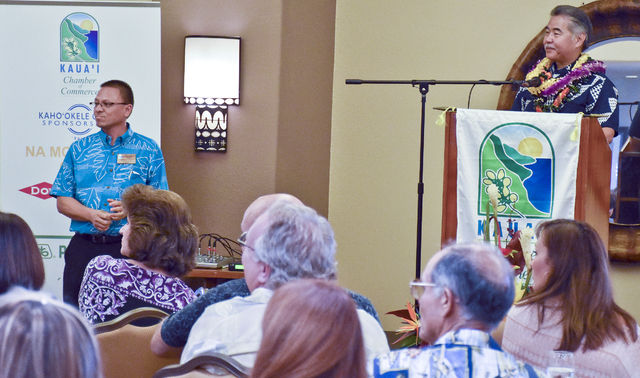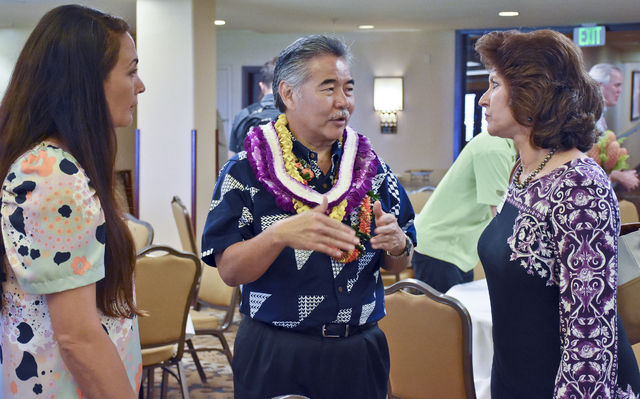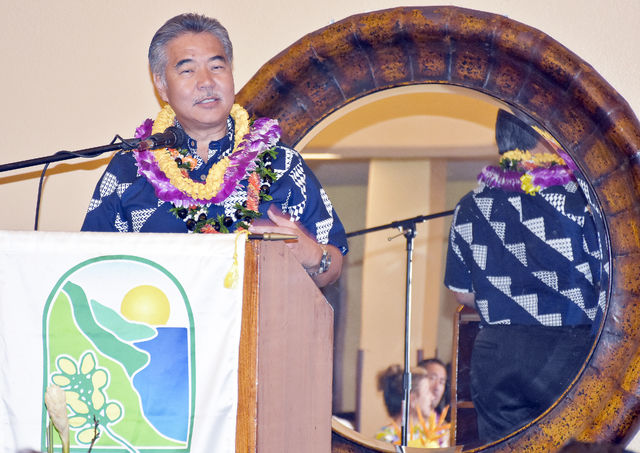KAPAA — Gov. David Ige channeled his inner-engineer on Tuesday when he summed up his governing philosophy: “It’s about execution: doing the right thing, in the right way.” The governor made the remark at a Kauai Chamber of Commerce luncheon
KAPAA — Gov. David Ige channeled his inner-engineer on Tuesday when he summed up his governing philosophy: “It’s about execution: doing the right thing, in the right way.”
The governor made the remark at a Kauai Chamber of Commerce luncheon during his first visit to the island since he was sworn into office in December. In a wide-ranging speech, the governor outlined his vision for the state and talked about challenges he’s faced early on in his administration.
On the state budget, Ige said he expects Hawaii will continue to run deficits of $100 million to $200 million per year for at least the next three years, despite a projected 5 percent increase in tax revenue over the same time period. The governor said entitlements and other unavoidable fixed costs are to blame for the cost overrun. As a result, the governor said the state will need to figure out how to deliver better services with limited tax dollars.
Doing that means the state will need to reinvent government.
“We need to encourage people to embrace change, embrace risk,” Ige said.
One area of inefficient government cited by the governor is transportation: Hawaii has a backlog of road projects that have been funded, but haven’t been started.
“We’ve been on the failing list – we’ve been receiving Fs from the (federal) Department of Transportation,” Ige said. But, “In six months, we’ve taken that backlog from $850 million to less than $700 million.”
The governor said his administration is working to get to the point where the backlog is “virtually zero.” To do that, Ige said he asked the federal government for technical assistance to help fix internal processes to ensure that projects are completed in a timely fashion.
The governor pointed to the state’s archaic payroll system as another area the government needs to be more efficient. He said the state still generates paper paystubs, printing 2 million pieces of paper per month.
“(I asked) Why do we do it? Can’t we do it electronically? They almost had a cow! They only know how to generate that piece of paper.”
On jobs and the economy, Ige said the hospitality industry is changing, noting that the majority of visitors to Hawaii are now repeat visitors.
“The challenge then is that they want to do different things,” which requires ever-evolving opportunities. But, Ige said, “It’s got to be compatible with our communities.”
One of the first bills Ige signed into law commits the state to generating 100 percent renewable energy by 2045.
The governor believes the goal is attainable, and is having the University of Hawaii take the lead by requiring it to become completely sustainable a full 10 years earlier, by 2035.
“If we want to invite investment … then we need to make sure that our university leads the country in our commitment to net zero.”
Ige also said he is committed to doubling the amount of food produced for consumption in the state. To do that, state agriculture department will change its focus to provide more assistance to small farms by expanding agriculture extension programs and organizing cooperatives for food safety, marketing, and production.
Ige said these two initiatives could drastically benefit the state’s economy. The state spends $5.5 billion annually to import fuel for energy, and it spends about $3 billion to import food. If the state can become completely self-sustained in those two areas, then that money would stay in the state, the governor said.
The governor also wants to focus on more high-skill jobs, saying that he’s been, “a big proponent of digital media, creative media, and giving those opportunities to each and every student in every high school and middle school.”
The governor said he considered the legislative session, which ended in May, a success. Ige said the Legislature approved 252 bills during session, and that he has already signed about 100 of those into law. He has until June 29 to decide whether to sign or veto the remaining bills.
The speech was well received.
Cheryl Ann Farrell, who owns Hearts4Kauai, a small business that provides first aid and CPR training, said that she felt the governor came across as very sincere. That sentiment was echoed by Charlie King, co-owner of King Auto Center.
“I was very impressed with his knowledge and appreciated that his presentation was much different than the previous governor,” King said.
Christopher Gampon, general manager of Kiahuna Plantation and a Kauai Chamber of Commerce board member, said he found it, “Refreshing to hear that he has a technical background.” Gampon said the governor’s previous private sector experience combined with his years of public service brings a unique perspective to the role.




